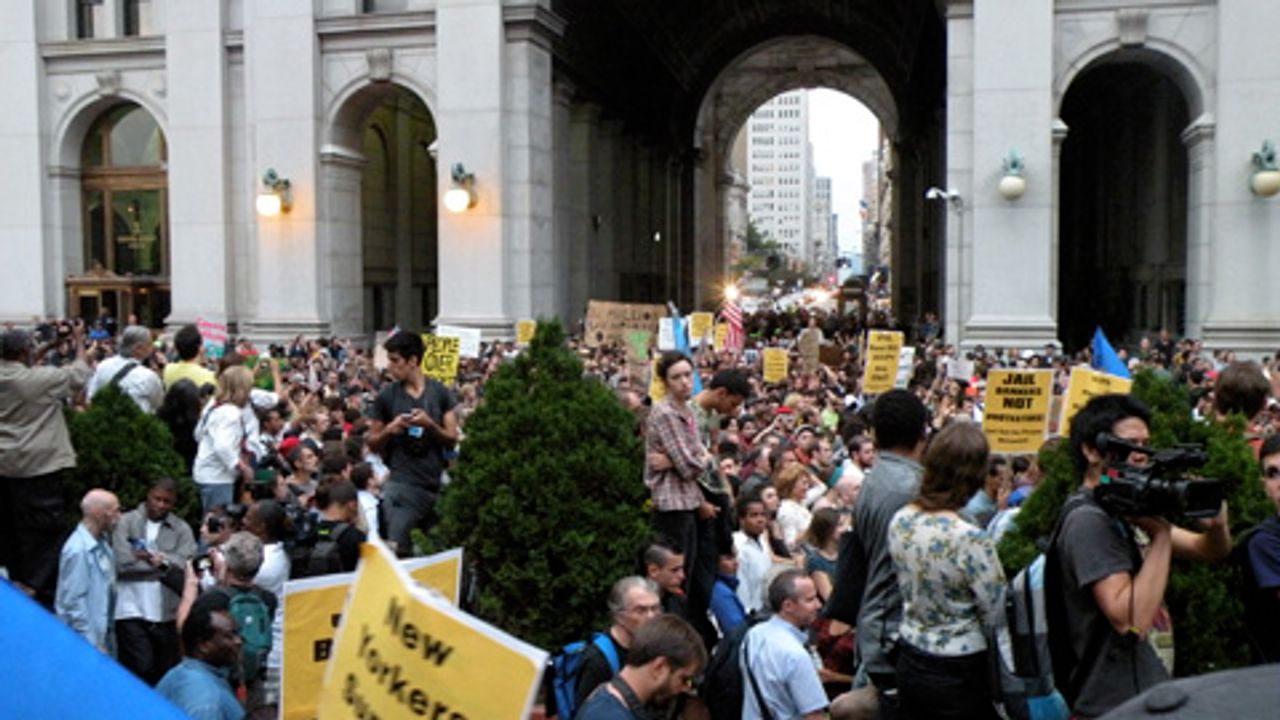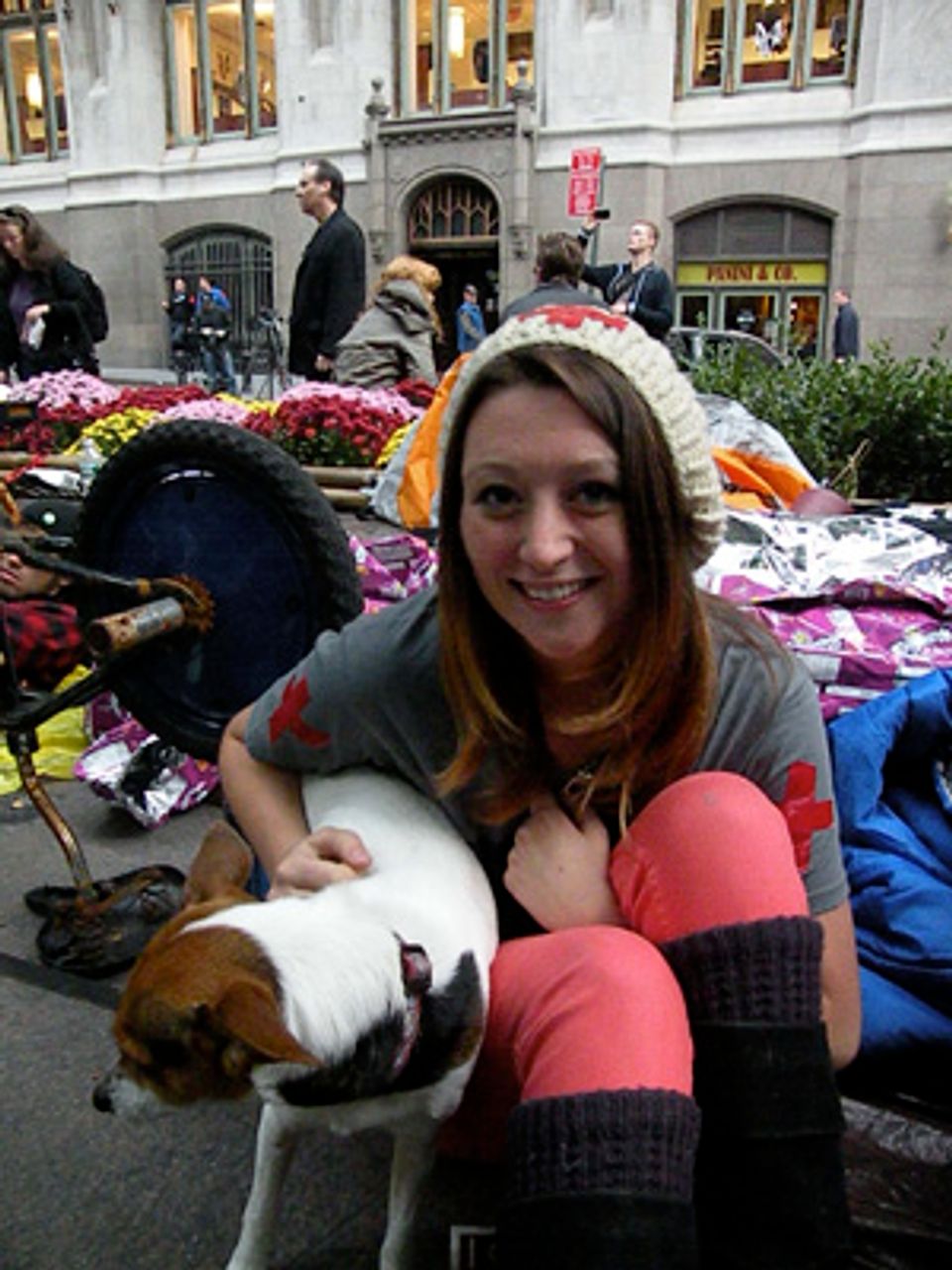
Over 700 anti-Wall Street protesters were arrested Saturday on the Brooklyn Bridge by the New York Police Department (NYPD) after the cops had allowed them to enter the roadway reserved for motorized vehicles.
The mass arrests mark a major escalation in police intimidation tactics. It came on the heels of acts of police brutality, such as the pepper-spraying of unresisting demonstrators and the arrest of over 80 marchers last weekend, which have sparked widespread anger and resulted in the swelling of the protest’s ranks.
Behind the demonstration, which began as an occupation of Zuccotti Plaza, a park near Wall Street, is the growing opposition in the US to the policies of the banks, corporations and the Obama administration, particularly among students and younger workers who confront an increasingly hostile jobs market, massive indebtedness due to student loans and the relentless attacks on wage levels and social benefits.
In the past week, similar protests have spread to some 80 other American cities and towns. In Boston on Friday, nearly 3,000 people rallied against the Bank of America’s fraudulent foreclosure policies. The Boston police arrested dozens of supporters. And in Los Angeles, hundreds of demonstrators camped out Saturday night in front of City Hall.
Many of those who participated in Saturday’s protest have charged that the New York City police deliberately entrapped the demonstrators so that they could round up as many of them as possible and thereby intimidate those involved in the action and others who might be thinking about joining them.
Video footage shot by observers shows the NYPD walking in front of the several thousand protesters as they entered the roadway. Initially, they made no effort to stop them. It was only after hundreds of protesters were on the roadway that the police formed a skirmish line somewhere near the middle of the bridge, stopping the march and corralling the protesters at both ends. Then the arrests began.
Many of the protesters have charged that the police deliberately led them into a trap. The New York Times quoted Jesse A. Myerson, a media spokesperson for Occupy Wall Street, as saying, “The cops watched and did nothing, indeed, seemed to guide us onto the roadway.” Blogger Kevin Gosztola, who was present at the events, observed, “The NYPD could have just kept going on the bridge and then led the protesters to a side road on the other side and asked them to disperse.”
The Times added that all of the protesters that it spoke to “insisted that the police had made no mention that the roadway was off limits.”
The NYPD released a video on Sunday showing officers announcing over a bullhorn to the demonstrators that they would be arrested if they did not leave the roadway. Those in the rear almost certainly could not understand the announcement, which could barely be heard over the chants of the front ranks of the demonstrators.
There is no question that the police were prepared for mass arrests. A number of observers commented on the presence of Correction Department buses near the bridge, and police came with bundles of zip-lock handcuffs on their belts.
Most of the protesters were charged with disorderly conduct and released.
The occupation of Zuccotti Plaza (renamed Liberty Plaza by protesters) began on September 17 with a march of thousands of people in lower Manhattan. At a subsequent support demonstration near Union Square last Saturday, over 80 people were arrested and a group of several young women was pepper-sprayed in an unprovoked attack by an NYPD deputy inspector, Anthony Bologna.
The brutality displayed by the NYPD has provoked revulsion throughout a city in which the police routinely violate the democratic rights of its citizens, shoot first and ask questions later, conduct spying operations on dissenters and relentlessly stop and frisk minority youth. Police have kept up a steady stream of harassment and bullying against the Wall Street occupiers and their supporters.
New York’s billionaire mayor, Michael Bloomberg, was asked on his weekly radio show if he would allow the protesters to stay. He replied, “We’ll see. People have a right to protest, but we also have to make sure that people who don’t want to protest can go down the streets unmolested.”
Bloomberg refused to comment on the police actions, and the city is organizing a whitewash investigation of the pepper-spray incident.
As the New York protest has begun to spark interest among broader layers of working people, the movement has also seen a rush of attention of supporters of the establishment and of the Democratic Party in particular. Various New York City trade unions have announced their support, including the Transport Workers Union (TWU) Local 100, the United Federation of Teachers and the SEIU. Apart from the fleeting appearance of a few dozen bureaucrats at Friday’s protest, the endorsements have not led to any change in the numbers of demonstrators.
In the past week, the former Democratic New York State governor, David Paterson, has appeared at the protest, while Democratic-aligned political groups like Moveon.org and the Working Families Parties have also endorsed the action.
The union officialdom, which has collaborated in imposing the demands for austerity cutbacks on their own members, and the Democratic politicians, who are servants of the banks and big business, have no interest in directing a mass movement against Wall Street. Their aim, in all probability worked out in conjunction with the Bloomberg administration, is to smother the largely spontaneous protest and, if possible, channel it behind the Democratic Party and the Obama reelection campaign.
 Lily
LilyThe World Socialist Web Site spoke to one young woman who was arrested on Saturday at the Brooklyn Bridge. Lily did not want to give her full name.
“I was arrested and just got out of jail last night at 2 a.m., so I may not be as clear as usual. I am a medic. I have been here since day one, and I started the medic committee with a trash bag full of supplies.
“The march Saturday was the biggest we’ve had. I guess it was about 2,000 people. I was videotaping the whole thing. The walkway on the bridge is so narrow that the marchers began piling up.”
Lily explained that the path between the entrance to the bridge’s walkway and the roadway, where motor vehicle traffic passes, is narrow, and the marchers had stopped traffic by trying to enter the walkway.
“A few groups,” she continued, “began chanting our chant, ‘Whose streets? Our streets!’ The police were in the roadway. When the NYPD doesn’t want us to go someplace they make it very clear.
“The NYPD started backing up the street [the roadway] before we started up there, before the march chose to go up there. The march was so pumped up, we just went there and stopped traffic.
“It was a trap. It was a setup. They only told us to get off the street once, and they had already backed up, almost inviting us up there. A friend of mine heard one policeman say to another, ‘It worked perfectly. They fell into it.’
“If you were at the back of this, you wouldn’t have known that you were going where we had been warned not to go. The police kept walking alongside of us, and we thought they were actually escorting us.
“We planned just go into Brooklyn, and to Williamsburg, and then disperse. We wanted to get there and set up a general assembly there.
“We were halfway across the bridge, myself and another medic, at the front when everything started happening. The police then formed a line, blocking us off, and we couldn’t go any further. We started a chant. ‘This is a peaceful protest.’ Then the police leaped in and grabbed people viciously and started arresting. We kept our arms linked until they pulled us out.
“There was a lot of three cops to a person to hold people down. Our medic captain was the fourth person to be arrested, even though we medics stayed to the side. Then it got bad with police leaping in and pulling people. We kept telling them there were children in the crowd. They grabbed one protester and threw him to the ground and there was a sickening sound—a thud, which you never want to hear in your life—when his head hit the ground. He was arrested and taken. I hope he was taken to a hospital. Last weekend they left a kid who was knocked out cold for two hours in a police van.
“They got almost 700 arrests, and cut the march in half so no one could get in or out. I wanted to keep out and not get arrested. They were kettling us to strike terror, while the media and lawyers were walking on the sidewalk. They told them to keep moving. We would yell our names so the lawyer would know everyone who was arrested. Then it came to a point where we all realized there was nothing we could do. We would all be arrested, and we became calmer.
“They split the crowd up and took half to the 77th Precinct in Brooklyn and half to the First Precinct in Manhattan, because there were so many of us. The charges depended on who your arresting officer was. Some got a ticket for blocking traffic. Some got disorderly conduct. Some people got three tickets. I got a disorderly conduct ticket.
“No one was read their rights. Everyone was cuffed and put in jail. I was in the last group to leave the bridge. They put us into a bus. We were in the rain for an hour and half before they took us away. We got to the precinct, and they did the booking. They took a picture of us with the police officer. There was a cell with 130 guys in it. We walked by and they all cheered with their fists raised, but we were marched to the back to a holding cell for girls.
“I was put in a cell by myself at first for two and half hours. Later I was put in a cell with four other girls for four hours. We each got two slices of bread with mustard and a pint of milk.
“One person at the 77th Precinct had nothing to eat for 15 hours. There was one group who came out at 4:30 a.m., and they marched to the park chanting.
“Everyone is here for a different reason, but everyone thinks something has to be done. We need to take back democracy, which has been taken away. Our whole First Amendment has been taken away from us.”
